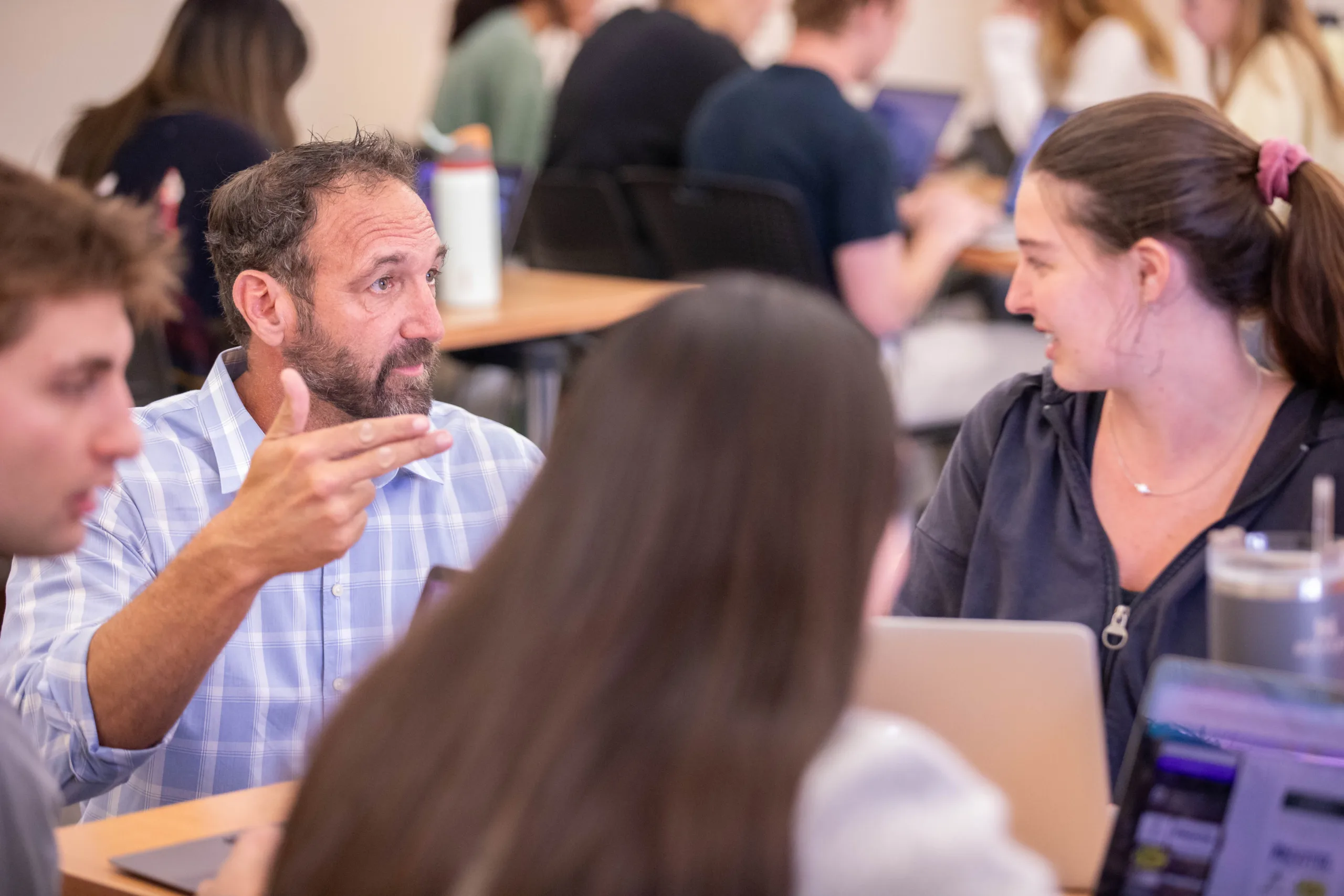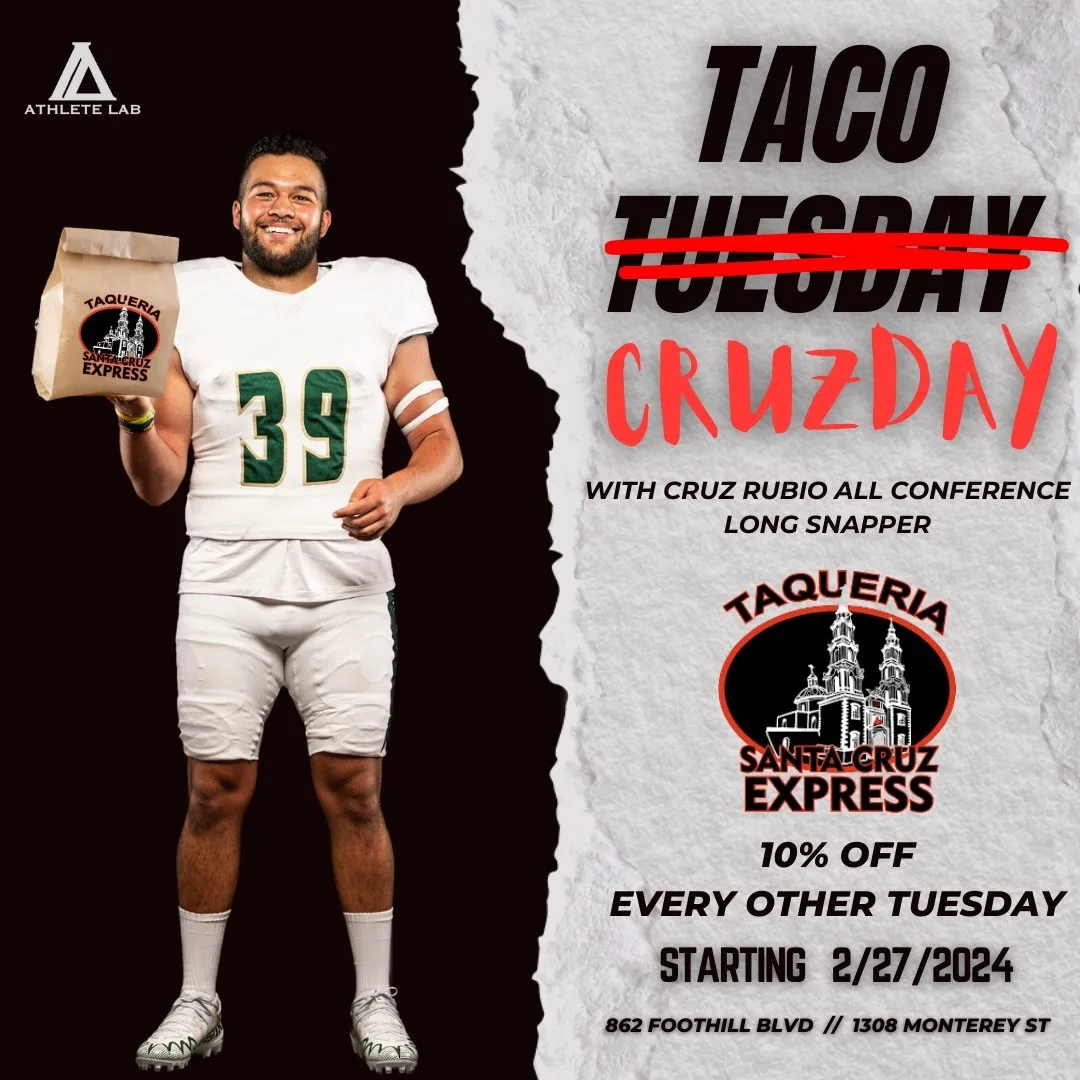Scoring Promotional Deals: Marketing Class Acts as a Full-Service Creative Agency for College Athletes

Randy Rovegno talks to students in his marketing projects class, which he calls the Athlete Lab. (Photo/Jahan Ramezani)
In a small, windowless office, marketing professor Randy Rovegno and student Shaylin Su’a are on speaker phone with Cruz Rubio, a long snapper for the Cal Poly football team, discussing promotional opportunities.
Su’a asks about his social media activity, interests and favorite local businesses.
“What’s your favorite restaurant?” she asks.
Rubio tells her he likes Taqueria Santa Cruz, near campus. Then Rovegno, with long snapping in mind, suddenly chimes in with an idea for a restaurant ad.
“Imagine if you see a spot on social and it’s all upside down,” says Rovegno, picturing Rubio’s typical view before snapping a football to a punter. “And all of the sudden we pull back, and it’s you long snapping, and you say something, like, ‘Seeing it from my perspective!’”

Students from Rovegno’s Athlete Lab work with Cruz Rubio a long snapper on the Cal Poly football team, on a spot promoting a local restaurant. Pictured are, left to right, Laurel Yocum, Keiry De Leon, Aiden Velasquez and Rubio. (Photo/Jahan Ramezani)
“Oh, yeah – that’s phenomenal,” Rubio says.
Now that college athletes can profit for their name, image and likeness (NIL), Rovegno is working with students in his Marketing Projects class to operate what he calls the Athlete Lab, which provides college athletes with opportunities and tools to promote products.
“It’s a senior level marketing class that serves as an internal sports agency to support their student athlete peers and also get the local community to help facilitate opportunities,” Rovegno said.
Rovegno brings 30 years of sports and entertainment marketing experience to the class, having worked at Fox Sports and CBS, where he was vice president of marketing. With his own agency, Longboard Marketing, he also performed work for ESPN, Disney, ABC and NBC, and some of the sports campaigns he worked on included famous athletes such as Rollie Fingers, Ronnie Lott, and Drew Brees.
Eager to share his knowledge, Rovegno had guest lectured for 15 years, including a stint at his alma mater, Arizona State, before coming to Cal Poly last fall.
“I always knew eventually I’d wind up teaching full time,” he said.
At Cal Poly, he immediately launched his Athlete Lab, an idea he carried over from Arizona State.
For well over a century, college athletes were considered strictly amateurs and not allowed to profit from their participation in sports. But in 2021, the NCAA overturned its rule forbidding the athletes from making NIL money.
Since then, star athletes, like Ohio State receiver Marvin Harrison Jr. and University of Miami basketball twins Haley and Hanna Cavinder, have profited greatly. But while Harrison is valued at $1.4 million and the Cavinder twins have reportedly made over $2 million off NIL deals, most college athletes aren’t going to get rich off their image.
“Many student athletes are trying to navigate this new landscape on their own, which can be very tricky.”
Cruz Rubio, Cal Poly Mustangs long snapper
“The new NIL rules have definitely changed the landscape of college athletics, favoring those schools that have wealthy donors and alumni,” said Kate Slack, a member of the Cal Poly volleyball team, who also took Rovegno’s class as a marketing student. “For Cal Poly, specifically, there are a lot of local opportunities, but we don’t have as much large-scale opportunities as nationally known (sports) schools might have.”
The class connected Aidan McCarthy, a record-breaking Mustangs track star, with Quickie, a food delivery business that launched at Cal Poly, for promo spots, emphasizing the speed of Quickie deliveries. And members of the volleyball team recently appeared at Athleta women’s apparel store in San Luis Obispo, to sign autographs.
“It’s all scale,” Rovegno said. “Here we’re working for product, trade, cash or Mr. Pickle’s gift cards. And it allows them to get their profile up, it gives them some swag, and they’re out there in the community, so if someone sees them doing a promotion, they might think, ‘I want to hire that guy.’”
Because the rule change is new, college athletes don’t know what opportunities exist – or how to pursue them.
“Many student athletes are trying to navigate this new landscape on their own, which can be very tricky,” said Rubio, the long snapper. “But with the guidance and knowledge of Randy, it makes the whole process smooth and stress free.”
For each athlete the lab works with, students perform a SWOT (strengths, weaknesses, opportunities, threats) analysis, complete with graphics. Star-quality on the field is great, Rovegno said, but so too is personality.

Kate Slack, a member of the Mustangs volleyball team, signs autographs during a promotional event at Athleta, a woman’s apparel store in San Luis Obispo. Slack also took the marketing projects class. (Photo/JP Vega)
In one recent class, Rovegno addressed the students as if they were employees at a creative agency. He showed them behind-the-scenes images of a Quickie video spot, then talked about some of the athletes they were working with, including Mackenzie Samuel, a goalie on the women’s soccer team, engineering student and pilot, and Carson Jones, an agriculture business student who is on both the football and rodeo teams.
“If he wrestles 2,000-pound steer, I’m guessing he’s pretty tough,” Rovegno says, suggesting Boot Barn could be a prospective endorsement.
After Rovegno’s updates, the class split into teams, each representing athletes from different sports. At the Athlete Lab, students serve as account executives, project managers, and content creators.
As both an athlete and a student in the class, Slack has learned how to brand herself, which includes keeping consistent – and non-controversial – on all social media platforms.
“Another thing that we’ve learned in our class is to always have an elevator pitch ready, which is very important for branding,” she said.
Rubio says he knows several other athletes that are working with the lab, and it has been a positive experience.
LAB WORK GALLERY: Students in Randy Rovegno’s marketing projects course work with athletes, who can now endorse products and organizations for profit under a recent NCAA rule change. (Photos: Cal Poly Athletics, Jahan Ramezani, JP Vega)
A few weeks after his initial call with Rovegno and Su’a, Rubio walks out the front doors of Taqueria Santa Cruz, holding a football as Keiry De Leon records video with her smart phone.
“What’s up, Mustangs – this is Cruz Rubio, all-conference long snapper,” he says, looking into the camera. “Join me this Tuesday at 5 o’clock for ten percent off your order.”
Rubio’s market

Cruz Rubio appears in an ad students created, promoting a local restaurant.
ing team – including De Leon, DeMarcus Oandasan, Aiden Velasquez and Laurel Yocum – is shooting multiple video spots with Rubio, offering a script and direction.
“Don’t be afraid to laugh it up,” Oandasan says. “It can be a little funny.”
“Okay, cool,” Rubio says, as he prepares for the next take.
Eventually, the spots will appear as promotion on the restaurant’s social media sites – the end result of a unique real-world Learn by Doing project.
“The students get to learn and experiment within their class, and student athletes get to benefit from the whole situation by essentially being guinea pigs for them,” said Rubio, a political science major.
Rovegno hopes to expand the class and garner Cal Poly a reputation for its NIL work beyond San Luis Obispo.
Already, word of mouth has spread about what the class can do locally.
“I’m fielding probably three or four calls a week from athletes,” Rovegno said. “Which is exactly what we want.”


















